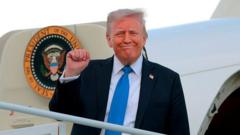Despite past comments hinting at a desire for more than two terms, Trump stated unequivocally on NBC's Meet the Press that he plans to honor the U.S. Constitution, which limits presidents to two terms.
Trump Affirms He Won't Pursue Third Presidential Term

Trump Affirms He Won't Pursue Third Presidential Term
In a recent interview, Trump makes it clear that he won't seek a third term as president amid ongoing speculation.
In a candid conversation with Kristen Welker, former President Donald Trump sought to dispel rumors about pursuing a third presidential term, stating during the NBC interview that he will remain a two-term president. “I always thought that was very important,” remarked Trump, firmly reiterating his stance as he approaches the end of his second term in January 2029. Although he had previously joked about the possibility of a third term, calling it a trolling tactic against the "fake news media," his recent comments aim to clarify his intentions.
The backdrop to this declaration includes the sale of "Trump 2028" merchandise by his company, which has fueled speculation among his supporters. Trump revealed that he has been receiving many requests from individuals urging him to consider extending his presidency, but noted that he believes it's unconstitutional. “So many people want me to do it... but this is not something I'm looking to do,” he articulated, while also endorsing potential successors like Vice-President JD Vance and Secretary of State Marco Rubio.
Legal experts confirmed that the 22nd Amendment prohibits anyone from being elected president more than twice, emphasizing that amending this law would require significant legislative approval—a challenging endeavor. Some Trump supporters argue, however, that an untested loophole could allow for a third term, a notion Trump did not fully endorse but acknowledged by stating he hears various opinions as a major supporter.
During the same interview, Trump addressed economic issues that have arisen during his presidency. He defended his controversial tariff strategies, which led to signs of economic slowdown, asserting that this phase represents a "transition period." He confidently stated that the U.S. economy could emerge stronger than ever, despite growing concerns among economists. Trump dismissed fears of product shortages due to tariffs, claiming consumers simply need fewer varieties of goods.
In a more contentious discussion, Trump confronted criticisms regarding his immigration policies and the Fifth Amendment's provision for due process. Defending his approach to deportation, he emphasized reliance on his “brilliant lawyers” to navigate legal challenges, all while upholding the Constitution and addressing ongoing immigration emergencies.
Reflecting on international relations, Trump commented on Canada’s contribution to defense and included a notable remark that he does not foresee any aggressive actions against Canada, despite previous tensions. Additionally, his immigration state of emergency declaration from his first day in office remains a point of debate, especially as illegal border crossings decrease.
As the 2024 presidential race approaches, Trump's affirmations and ongoing commentary continue to shape discussions on his legacy and the future direction of the Republican Party.
The backdrop to this declaration includes the sale of "Trump 2028" merchandise by his company, which has fueled speculation among his supporters. Trump revealed that he has been receiving many requests from individuals urging him to consider extending his presidency, but noted that he believes it's unconstitutional. “So many people want me to do it... but this is not something I'm looking to do,” he articulated, while also endorsing potential successors like Vice-President JD Vance and Secretary of State Marco Rubio.
Legal experts confirmed that the 22nd Amendment prohibits anyone from being elected president more than twice, emphasizing that amending this law would require significant legislative approval—a challenging endeavor. Some Trump supporters argue, however, that an untested loophole could allow for a third term, a notion Trump did not fully endorse but acknowledged by stating he hears various opinions as a major supporter.
During the same interview, Trump addressed economic issues that have arisen during his presidency. He defended his controversial tariff strategies, which led to signs of economic slowdown, asserting that this phase represents a "transition period." He confidently stated that the U.S. economy could emerge stronger than ever, despite growing concerns among economists. Trump dismissed fears of product shortages due to tariffs, claiming consumers simply need fewer varieties of goods.
In a more contentious discussion, Trump confronted criticisms regarding his immigration policies and the Fifth Amendment's provision for due process. Defending his approach to deportation, he emphasized reliance on his “brilliant lawyers” to navigate legal challenges, all while upholding the Constitution and addressing ongoing immigration emergencies.
Reflecting on international relations, Trump commented on Canada’s contribution to defense and included a notable remark that he does not foresee any aggressive actions against Canada, despite previous tensions. Additionally, his immigration state of emergency declaration from his first day in office remains a point of debate, especially as illegal border crossings decrease.
As the 2024 presidential race approaches, Trump's affirmations and ongoing commentary continue to shape discussions on his legacy and the future direction of the Republican Party.




















